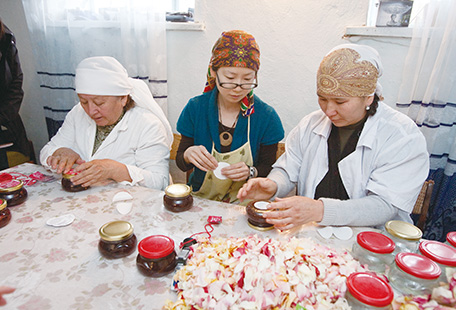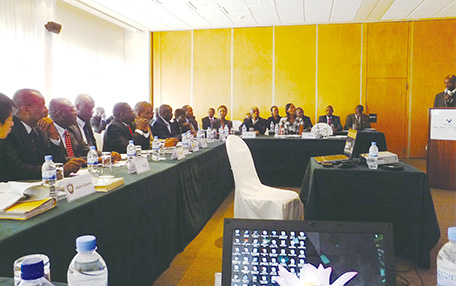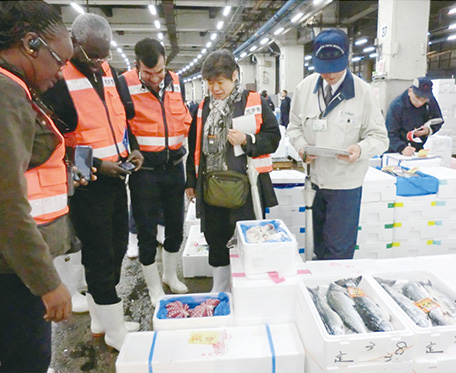Japan's Official Development Assistance White Paper 2013
(3) Cooperation between Trade, Investment, and Other Official Flows (OOF)
Private sector plays a leading role for sustainable growth in developing countries. Also it is important to revitalize private-sector activities such as the development of industry and the expansion of trade and investment. However, in developing countries beset by a variety of challenges, it can sometimes be difficult to set in place an environment that attracts private investment. Therefore supports from the international community are required.
<Japan’s Efforts>
Japan utilizes ODA and Other Official Flows (OOF)* to support advancements of small and medium enterprises (SMEs) in developing countries, transfer of Japan’s industrial technology, and formulation of economic policies. In addition, Japan supports improvements of trade and investment environment and development of economic infrastructures in order to enhance the export capabilities and competitiveness of developing countries.
The World Trade Organization (WTO) Doha Round Negotiations (the Doha Development Agenda)* which started in 2001 also emphasizes the promotion of development through participation in the multilateral free trading system by developing countries. Japan has contributed to the trust fund set up within the WTO with an aim to improve the capacity of developing countries to engage in trade negotiations and participate in the global market, thereby gaining the ability to implement the WTO agreements.
Regarding access to Japanese markets, Japan has implemented the Generalized System of Preferences (GSP), which applies lower tariff rates for imports of products from developing countries. Japan provides duty-free quota-free access* for Least Developed Countries (LDCs)*. In addition, Japan also actively promotes Economic Partnership Agreements (EPAs)*, and tries to create an environment for economic growth in developing countries through liberalization of trade and investment.

Community empowerment project through small business promotion by One Village One Product approach in Kyrgyzstan Republic. Ms. Shimada, a Japan Overseas Cooperation Volunteer, making jam with local women. (Photo: Shinichi Kuno / JICA)
In recent years, discussions of Aid for Trade (AfT)* become activated at various international forums, including the WTO and the OECD, as a means of further promoting support by developed countries, including Japan. Japan implemented strategy for Aid for Trade called “Development Initiative for Trade 2009,*” with approximately $12 billion in total support for trade-related projects. This Initiative is highly praised by numerous countries. Japan provides funds for the development of transportation networks vital to trade, including ports, roads, and bridges, as well as for projects to construct power plants and power grids, etc. It also provides technical cooperation in trade-related areas, including the education of customs officials. Japan also provides assistance to small-scale production groups and small companies in developing countries for the One Village, One Product Campaign*. In addition, Japan supports developing countries in attracting private sector investment by identifying issues unique to those countries, and recommending measures to promote investment.
Further, Japan is proactively engaged with the Regional Technical Group on Aid for Trade for Asia and the Pacific which researches successful examples of development cooperation that has contributed to economic growth through exports in the Asia region. At the Fourth Aid for Trade Global Review Meeting held in July 2013, examples of Japan’s success in development cooperation (such as promotion of public-private partnership) and other results from meetings of the Technical Group were introduced to representatives of other regions, and garnered high praise from participating countries. Furthermore, as a technical cooperation of the Ministry of Economy, Trade and Industry (METI) to support the overseas expansion of Japanese companies, the Ministry has assisted their efforts to secure advanced local personnel through the human resource development of local industries, collaborating with local universities, etc. to offer corporate culture courses, job fairs, and other means.
Glossary
- *Other Official Flows (OOF)
- Flows of funds to developing countries from the government which are not considered to be ODA because the main purpose is not development. Examples include export credit, direct investment, financing of international organizations, etc.
- *Doha Round Negotiations (the Doha Development Agenda)
- Negotiations between multiple WTO Members aimed at liberalizing trade in a wide range of fields, including reduction/elimination of tariffs on industrial products and agriculture, forestry and fisheries industry products, and deregulations in the service sector. One of their challenges is the development of developing countries through trade.
- *Duty-free quota-free access
- Measures implemented by the developed countries to eliminate customs duties, quotas, and other obstacles to exports from least developed countries (LDCs) to the developed countries. The number of applicable products has expanded, and approximately 98% of products exported by LDCs to Japan can be imported without payment of duties and without quotas. (As of July 2013)
- *Least Developed Countries (LDCs)
- Countries classified by the United Nations to be particularly lagging in development even compared to other developing countries, based on their income levels. Countries that meet certain criteria, including per capita gross national income (GNI) of $992 or less between 2008 and 2010. As of March 2013, there are 49 countries that have been so designated: 7 in Asia, 2 in Middle East and North Africa, 34 in Sub-Saharan Africa, 1 in Latin America, and 5 in Oceania. (See this page)
- *Economic Partnership Agreement (EPA)
- A comprehensive economic agreement between specific countries (or regions) that, in addition to free-trade agreements (FTA) that stipulate the reduction and elimination of tariffs of goods and the barriers in trade in services, aims to make rules in such areas as investment, movement of people, government procurement, protection of intellectual property, competition policy, and bilateral cooperation intended to enhance broad economic ties.
- *Aid for Trade (AfT)
- Assistance is provided to developing countries to improve trade-related capabilities and to prepare and maintain infrastructures, for the purpose of aiding developing countries in achieving economic growth through the multilateral trading system under the WTO.
- *Development Initiative for Trade 2009
- Comprehensive measures to support sustainable development of developing countries through trade. For developing countries to enjoy the benefits of the free trade system, not only must trade be liberalized, but it must be built on the three pillars of (i) production (improvement of the ability to produce competitive products), (ii) distribution and marketing (preparation and maintenance of a domestic and overseas logistics system including the distribution infrastructure), and (iii) purchasing (pioneering of markets). The aim is to combine means of assistance such as “knowledge and technology,” “funds,” “people,” and “systems” with these three aspects, and provide comprehensive support that connects producers and laborers in developing countries to consumers both in the developed countries and developing countries.
- *One Village, One Product Campaign
- Overseas utilization of an approach that began in Oita Prefecture, Japan in 1979. The aim is to create jobs and revitalize the community by developing unique local products through the utilization of local resources and traditional techniques. Efforts are made to focus on handicrafts, textiles, toys, and other attractive products that emanate unique ethnic characteristics of developing countries in Asia and Africa, etc., and reach out to a wider range of people, thereby aiding in the improvement of exports of products from developing countries.
●Kenya, Tanzania, Uganda, Rwanda, and Burundi
Capacity Building for the Customs Administrations of the Eastern African Region (Phase 2)
Technical Cooperation Project (September 4, 2009 - Ongoing)
The eastern region of Africa, including Kenya, Tanzania, Uganda, Rwanda, and Burundi, aims to achieve sustainable economic growth through trade and distribution promotion. To this end, facilitating customs clearance procedures is vital. This region takes steps to facilitate and increase the efficiency of customs clearance procedures by clearing all export and import procedures at the border at one stop on either side of the border, rather the normal two stops on both sides (promotion of one stop service).
Japan implemented the Project on Capacity Building for Customs Officers in Kenya, Tanzania, and Uganda from 2007 to 2009 to improve the capacities of their customs administrations and build a One Stop Border Post (OSBP)* system. This project implemented a pilot program in Namanga at the border of Kenya and Tanzania and in Malaba at the border of Kenya and Uganda, which consisted of the introduction of ICT, equipment, joint border surveillance, and joint surveillance of waters.
Through Phase 1 of the project, further efforts were deemed necessary to build up the capacities of customs administrations and of customs agents. Japan therefore implemented Capacity Building for the Customs Administrations of the Eastern African Region Project (Phase 2) for four years from September 2009 to September 2013 in five countries, including the additions of Rwanda and Burundi. In Phase 2, Japan dispatched a total of 5 long-term experts and 34 short-term experts, provided a customs clearance processing system and supplied equipment necessary for the surveillance of borders and waters, as well as held trainings attended by a total of 71 people. Through these activities, Japan contributes to the capacity building of customs officers and customs agents in this region.
(As of August 2013)
* See “Glossary” on this page.

Talks being held on facilitating and increasing the efficiency of customs clearance procedures (Photo: JICA)
●Senegal
Seminar on Investment Opportunity in Senegal
Technical Cooperation Individual Project (Training) (April 7 - April 13, 2013)
Located in the most western part of the African continent, Senegal is experiencing strong economic development, particularly in its coastal cities. However, Senegal is geographically distant from Japan. Furthermore, as the official language of Senegal is French, information concerning Senegal’s economic activities is not easily accessible for Japanese companies, and consequently a limited number of Japanese companies invest in Senegal.
Therefore, in order to leverage Japanese technology in assisting development in Senegal, Japan dispatched experts to the Agence Nationale de la Promotion des Investissements et Grands Traveaux (APIX), which is responsible for promoting foreign investment and improving the investment environment.
In April 2013, 11 public and private Senegalese representatives were invited to Japan to learn about Japanese advanced technologies and the characteristics of the Japanese marketplace. During their visit, JICA and JETRO also hosted a seminar on investment opportunities in Senegal for Japanese companies, in which 132 companies participated.
These initiatives have introduced to Japanese companies the possibilities for investment in the agricultural and fisheries industry of Senegal. This has been contributing to raising the interest of Japanese companies in expansion into Africa.

During their visit to the Tsukiji Market in Japan, public and private Senegalese representatives stopped by the fresh fish market upon discovering octopus from Morocco and Mauritania. (Photo: JICA)
